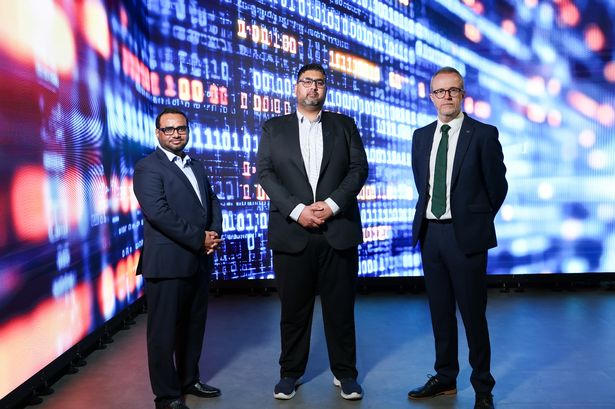Science
Northern Ireland’s AI Breakthrough Paves Way for 6G Innovations

A significant advancement in artificial intelligence from researchers at Ulster University could lead to groundbreaking applications in healthcare robotics, autonomous vehicles, and holographic technology. Dr Usman Madi, a PhD supervisor at the university, stated this week that Northern Ireland is “firmly on the global map” for its innovative research in AI and wireless technology, particularly as the world prepares for the rollout of 6G communications.
In an interview with Belfast Live, Dr Madi discussed the potential ramifications of 6G technology, which is currently in development worldwide. This next generation of wireless communication promises to deliver enhanced speeds, greater bandwidth, and lower latency than the existing 5G networks. A breakthrough unveiled at Ulster University, termed MIMONet, aims to facilitate this transition by employing deep learning techniques that reduce computational demands.
While the deployment of 5G continues to face challenges in Northern Ireland, including incidents of vandalism targeting signal towers, the advent of 6G represents a leap forward. Dr Madi emphasized the importance of this technology, stating, “6G will be transformative. It promises ultra-reliable, ultra-fast, and ultra-low-latency networks essential for technologies like autonomous vehicles and advanced healthcare robotics.”
The concept of “real-time digital twins” illustrates one of the many possible applications of this technology. Such digital models could create accurate virtual representations of human anatomy, allowing surgeons to perform operations remotely via robotics, all facilitated by a high-speed 6G network. For this vision to become a reality, however, a dependable, high-speed connection is crucial.
MIMONet, developed by PhD researcher Yunis Daha under the supervision of Dr Hadi, addresses a core challenge in global wireless communication: accurately detecting and processing signals when numerous devices are simultaneously connected. Conventional methods struggle with accuracy or require extensive computational resources, making them impractical for widespread use. MIMONet overcomes these limitations by using a lightweight deep learning architecture that enhances signal separation and detection, even in complex environments.
Dr Madi celebrated Northern Ireland’s capacity for technological innovation, remarking, “We have the trained manpower to produce technological inventions. One example is what we achieved with 6G.” He pointed out that despite its smaller scale, Northern Ireland is making significant contributions to the development of future communication technologies.
Reflecting on his journey, Dr Madi noted his experience working in various countries, including the United States and Denmark, before choosing to work in Northern Ireland due to its inclusivity and innovative spirit. He highlighted that 6G integrates AI at its core, supporting a wide range of connected devices, from drones to IoT applications and remote healthcare systems.
Addressing the recent incidents of vandalism against 5G infrastructure, Dr Madi acknowledged the societal concerns but remained focused on technological advancement. “We need to stay ahead of the curve. If someone is burning 5G masts, we can’t really shut down developing technologies,” he stated.
Yunis Daha, the researcher behind MIMONet, commented, “We’re tackling a fundamental bottleneck in wireless communication. By applying AI to one of the toughest engineering challenges, we’ve developed a system that improves accuracy while easing the processing load.”
Professor Dewar Finlay, Head of the School of Engineering at Ulster University, emphasized the pivotal role of research in driving innovation. He described the breakthrough in AI as an example of how academic institutions can advance critical areas. “This work is a major step forward in realizing the 6G networks of the future—networks that will be smarter, faster, and more sustainable,” he said.
As the global demand for faster and more efficient communication technologies increases, Northern Ireland stands poised to play a significant role in shaping the future of AI and wireless communication.
-

 Health3 months ago
Health3 months agoNeurologist Warns Excessive Use of Supplements Can Harm Brain
-

 Health3 months ago
Health3 months agoFiona Phillips’ Husband Shares Heartfelt Update on Her Alzheimer’s Journey
-

 Science2 months ago
Science2 months agoBrian Cox Addresses Claims of Alien Probe in 3I/ATLAS Discovery
-

 Science2 months ago
Science2 months agoNASA Investigates Unusual Comet 3I/ATLAS; New Findings Emerge
-

 Science1 month ago
Science1 month agoScientists Examine 3I/ATLAS: Alien Artifact or Cosmic Oddity?
-

 Entertainment5 months ago
Entertainment5 months agoKerry Katona Discusses Future Baby Plans and Brian McFadden’s Wedding
-

 Science1 month ago
Science1 month agoNASA Investigates Speedy Object 3I/ATLAS, Sparking Speculation
-

 Entertainment4 months ago
Entertainment4 months agoEmmerdale Faces Tension as Dylan and April’s Lives Hang in the Balance
-

 World3 months ago
World3 months agoCole Palmer’s Cryptic Message to Kobbie Mainoo Following Loan Talks
-

 Science1 month ago
Science1 month agoNASA Scientists Explore Origins of 3I/ATLAS, a Fast-Moving Visitor
-

 Entertainment2 months ago
Entertainment2 months agoLewis Cope Addresses Accusations of Dance Training Advantage
-

 Entertainment4 months ago
Entertainment4 months agoMajor Cast Changes at Coronation Street: Exits and Returns in 2025









